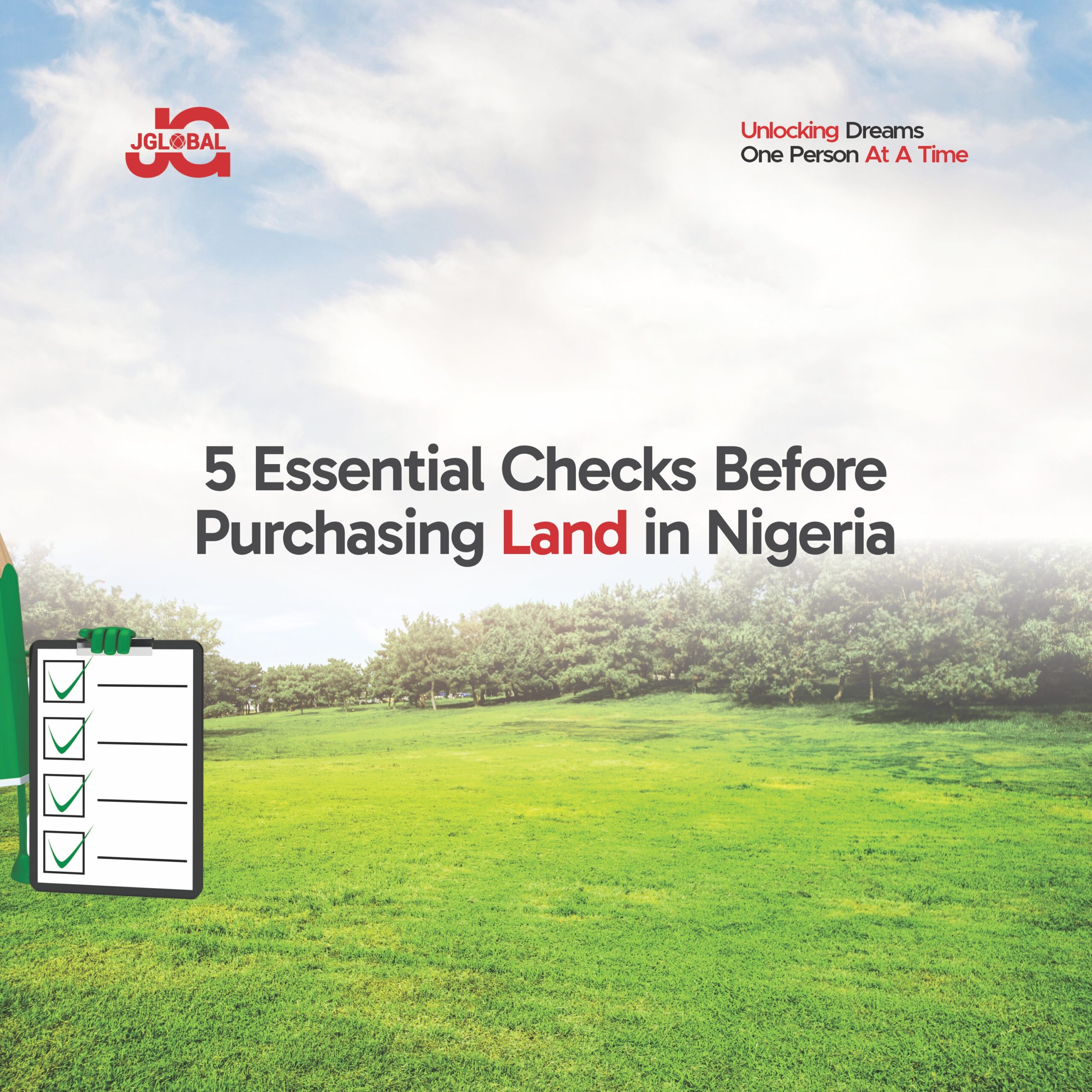5 ESSENTIAL CHECKS BEFORE PURCHASING LAND IN NIGERIA

Nigeria’s real estate market offers attractive opportunities for investment, but buying land requires careful consideration. To avoid costly mistakes, conduct these 5 essential checks before purchasing land in Nigeria.
1. PURPOSE OF THE PROPERTY
Before buying land, it’s important to determine its intended use. This will help you ensure that the land is suitable for your needs and complies with local regulations. Are you building your dream home? Starting a farm? Opening a business?
Here are some tips:
i. Check zoning laws: Familiarize yourself with Nigerian land use regulations and zoning laws to ensure your intended use aligns with local authorities’ requirements.
ii. Soil test: If you are farming, you need to know if your crops will grow there. Conduct a soil test to determine if the land is suitable for your crops.
iii. Building regulations: Verify that your planned structure meets local building codes and regulations.
2. BUDGET/COST OF LAND
The price tag is not all there is. Understanding the total cost of the land is essential to avoid unexpected expenses.
Some things to consider:
i. Consider your budget: Compare prices with similar lands in the area to ensure you’re getting a fair deal. It is also essential to consider your budget.
ii. Closing costs: Ask about any extra fees or taxes you might need to pay beyond the purchase price. Here is an article that can help you know some closing costs in Property.
iii. Negotiate: Don’t be afraid to haggle or seek professional help to negotiate prices.
iv. Payment plan: Explore options for installment payments to ease the financial burden.
Remember, the cheapest option isn’t always the best. Sometimes it’s worth paying a bit more for land that ticks all your other boxes.
3. LOCATION AND SIZE
The location of the land can significantly impact its value and usability. Carefully assess the surrounding area to ensure it meets your needs. Assess the land’s topography, boundaries, and potential environmental hazards.
i. Visit the land: Inspect the land in person to get a firsthand view of the property. This is why most real estate companies have inspection days. In a situation whereby you are not in the place, Get a reputable inspector to do the work for you.
ii. Check the neighborhood: Consider proximity to roads, schools, hospitals, and other amenities.
iii. Measure it up: Make sure the actual size matches what’s in the documents. You don’t want to pay for 100 square meters and only get 80SqM
iv. Think about the future: Consider how the area may develop and impact your land’s value.
4. GET THE RIGHT DOCUMENT
Ensuring the seller has the necessary documents is critical to a smooth transaction. These documents prove ownership, outline boundaries, and specify land use.
Here’s what you need to look out for:
i. Certificate of Occupancy (C of O): This is the big one. Ensure the seller possesses this document, which proves ownership.
READ MORE: C OF O
ii. Survey Plan: This document shows the exact boundaries and size of the land. No surprises about where your land ends and your neighbour’s begins.
READ MORE: UNDERSTANDING SURVEY PLANS
iii. Deed of Assignment: If the land has been sold before, this document shows the transfer of ownership.
iv. Governor’s Consent: This is needed when there’s a transfer of ownership.
v. Land Use Clearance: This tells you what you can actually do with the land. Farm? Build a house? It’s all in here.
vi. Gazette: This document is a government publication that contains details of land transactions, including the description of the land, the owner’s name, and any encumbrances or restrictions.
READ MORE ON GAZETTE
READ ALSO: DEED OF GIFT AND DEED OF CONVEYANCE
Which are also a necessity when looking to buy a land in Nigeria. Always get a lawyer to check these documents or a reputable real estate company to help you.
5. SECURE COMMUNITY AND GOVERNMENT APPROVAL
In Nigeria, it’s not just about dealing with the seller. You need to make sure the community and government are on board too. Ensure you have the necessary permits and comply with local regulations to avoid issues.
i. Talk to the locals: Sometimes, the community has a say in land sales. Build relationships with the community. Obtain necessary approvals from local communities and ensure compliance with Nigerian land law and regulations.
ii. Check for government plans: Ensure no government projects will affect your land.
iii. Ensure compliance and Permits: Follow all necessary laws and regulations to avoid issues.
Being on good terms with the community and following government rules will save you a lot of headaches down the road.
CONCLUSION
By meticulously following these 5 essential checks, you will minimize risks and make an informed decision when purchasing land in Nigeria. Consult a real estate professional for personalized guidance.



